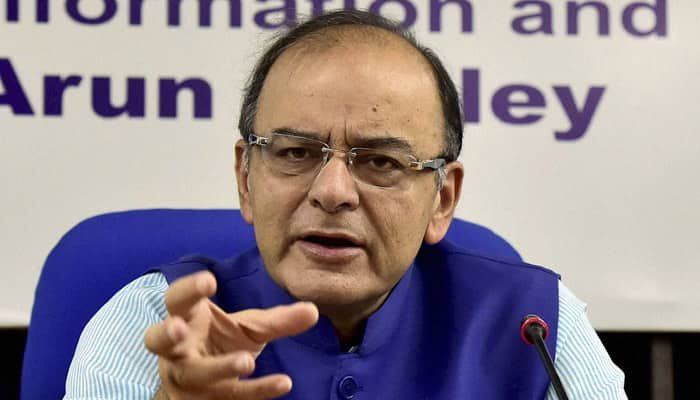New Delhi: Assuring that the GST rate will be less than 18 percent, Finance Minister Arun Jaitley Wednesday hinted at accepting Congress' stand on scrapping one percent additional tax but said the demand for incorporating the rate in the Constitutional Bill is not agreeable.
The Congress has been stalling passage of the Bill in the Rajya Sabha where the ruling NDA is in a minority.
Speaking at an industry meet on GST, he said the proposed one percent additional tax on inter-state sales was proposed as manufacturing states like Gujarat and Tamil Nadu are of the opinion that they would lose out on revenue as GST is more of a destination tax.
ALSO READ: IMF backs early rollout of GST, says will help create jobs, boost output
"I have told my friends in Parliament that I am ready to go back to those manufacturing states and tell them that we have guaranteed you to make good for all the loss suffered in the first five years. So, this one percent additional levy issue is resolvable," he said.
Referring to the recommendation of the panel headed by Chief Economic Advisor Arvind Subramanian, he said it is "settled" that the standard rate is going to be less than 18 percent or much less than 18 percent.
GST is to subsume all indirect taxes like excise duty, sales tax and service tax. In the new regime, there will be one Central GST, or C-GST, and State GST, or S-GST.
Currently, states levy sales tax or VAT on goods sold within their states and get a Central Sales Tax (CST) on sales made outside their territories.
ALSO READ: Arun Jaitley seeks Congress support to GST, says India can touch 9% growth
This CST will no longer be available in the new regime and a one percent additional tax was proposed to make up for it.
On the other condition that 18 percent tax should be put in the Constitutional Bill, Jaitley said, "Are tariffs part of Constitution? Can tariffs ever be cast in stone?"
"Suppose there is a drought or a flood in 10 states and for one week you need to raise the tariffs, are you then going to amend the Constitution?," he asked.
"GST is an idea which I have no doubt that, if not today, tomorrow it has to be approved, we are just going through the agony prior to the passage of the Bill," Jaitley said.
The rate of taxation, he said, will be decided by the GST Council. "After all, states and the Centre are surrendering their rights to the GST Council. The GST Council will decide the rate," the Finance Minister said.
He said there will be no single rate for all goods and services.
"For commodities which will be used by the weaker section, aam aadmi, will be lower (and) for the rest of the commodities you will have a standard rate.
"For luxury products, sin products, the rate will be higher. And therefore it is irrational to say that we put a 18 percent cap in the Constitution", Jaitley said.
"The third issue is that the dispute resolution mechanism should be created by the Centre. The states are not going to accept a dispute resolution mechanism created by the Centre and after the recommendations of the standing committee, Parliament itself has accepted a very simple position that the dispute should be resolved by the GST Council.
"And if (differences) still persist, the Council will create the dispute redressal mechanism. That issue actually becomes a non-issue. So the issues are actually resolvable, provided there is an intention to resolve them," Jaitley said.
The Minister said that doing away of the one percent additional levy would help consuming states and bring inter-state equity.
The GST, he said, was first proposed in 2006 and introduced in Parliament in 2011 by the previous UPA government.
However, there was no consensus among the states and the BJP-led NDA government brought over an "absolute consensus".
Only after the consensus, the Constitution Amendment Bill was introduced in Parliament.
"My friends in Congress party said even though it was they who brought out the Bill we want to again send it to the Select Committee (of Rajya Sabha). So it again went to Select Committee," he said.
The Rajya Sabha Select Committee cleared it with suggestions but Congress in the last monsoon session told the government that it can't pass it in that sitting and it can be taken up in the next winter session.
















